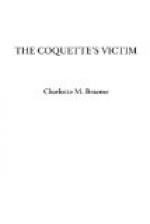He thought of nothing but obeying her. It was sadly against his high English spirit to steal into a man’s room and take from it; he would have preferred fighting until one or the other lay dead. But she had said nay, and it could not be. That very evening he called and was told the count was not in; the day following he repeated the call, and the servant, as he had said at the trial, was suspicious, not recognizing him as one of his master’s friends.
He called another evening, and, owing to the fact of there being a new servant, he was admitted into the count’s room. It was empty, although the gas was burning. He saw the little ivory casket, and with one stroke of his strong, young hand, opened it.
There lay the letters, underneath a watch and ring. He obeyed her; he did not lose one instant. He emptied the casket, carried the letters to the lighted gas, and burned them! Just as he had raised the watch and ring in his hand to replace them, the door opened and the count, with his servant, entered the room.
CHAPTER XIV.
The Trap Closed.
The count did not utter one word. He saw at one glance what had been done. He recognized the young gentleman whom he had sneered at as Lady Amelie’s victim. He understood at once what had been done.
“She had asked him to destroy the letters, and he has done it,” he said to himself. In one moment he had formed his scheme of revenge. He would give the young man in charge for stealing his watch and ring. If he cleared himself at all, he must tell the truth. He must tell that he had not come there to steal a watch, but to destroy Lady Lisle’s letters.
“If he confesses that,” said the quick-witted count to himself, “she will be doubly disgraced; if he declines to confess, I am at least revenged upon him.” So, until the entrance of the policeman, the two men stood and glared at each other.
“You can save yourself,” said the count, “if you will confess what you came for, and if you will write that confession down.”
Basil smiled contemptuously. “Of what do you charge me?” he said.
“I shall charge you with stealing my watch and ring,” was the reply.
“Knowing I am innocent?”
“The alternative lies before you. Confess, as I have said, and Lady Amelie suffers; deny, and you go to prison for stealing.”
It seemed to him far easier. “I will go to prison,” he thought, “I can give a false name; no one will know me. There will be no fuss, no stir, nothing known, and she, my queen, will be saved.”
Of course there was no common sense in such a proceeding, nothing but enthusiasm and romance. He certainly had not calculated upon the fact being known. He had really believed the false name would shield him. He found means through a heavy bribe to send one word to Lady Amelie; it was merely the word, “Destroyed.—B.C.” But it gave the queen of coquettes a sense of security she had not enjoyed for long. While Basil still lay in prison, Count Jules sought her.




